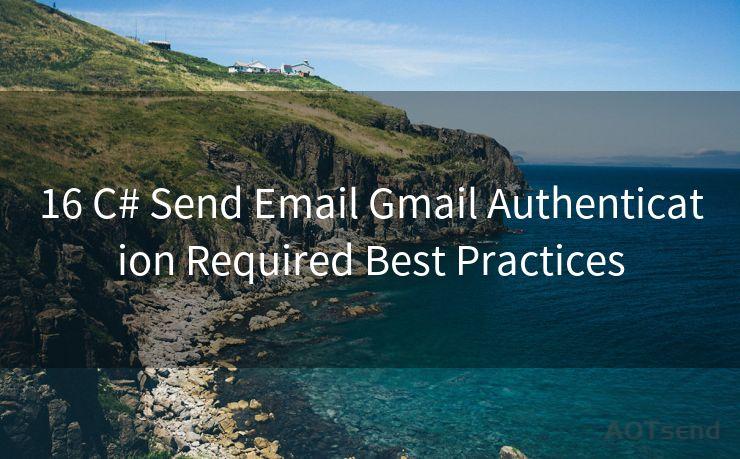16 C# Send Email Gmail Authentication Required Best Practices




When it comes to sending emails from a C# application using a Gmail account, there are several best practices to ensure smooth and secure communication. Adhering to these practices not only enhances the security of your email transmissions but also helps to avoid common pitfalls. Here are 16 essential best practices to follow when implementing email functionality in your C# applications:
1. Use OAuth 2.0 for Authentication
Gmail requires authentication for sending emails, and OAuth 2.0 is the recommended method. OAuth 2.0 provides a secure way to authorize your application to access Gmail services without exposing your Gmail credentials.
2. Enable Less Secure Apps (If Necessary)
If you're not using OAuth 2.0, you may need to enable "less secure apps" in your Gmail account settings. However, this option is becoming less common and may be phased out in the future, so it's best to migrate to OAuth 2.0 as soon as possible.
3. Handle Exceptions Gracefully
When sending emails, always be prepared to handle exceptions that may occur during the process. Use try-catch blocks to manage potential errors and provide appropriate user feedback.
4. Validate Email Addresses
Before sending an email, validate the recipient's email address to ensure it's in the correct format. This helps reduce bounce rates and improves the overall efficiency of your email delivery system.
5. Use Asynchronous Methods
When sending emails from a C# application, utilize asynchronous methods (such as SmtpClient.SendMailAsync) to avoid blocking the main thread and improve application responsiveness.
6. Configure SMTP Settings Correctly
Ensure that your SMTP settings, including the server address, port number, and encryption method, are configured correctly. Gmail typically uses smtp.gmail.com as the server address, port 587 for TLS/STARTTLS, and port 465 for SSL/TLS.
7. Implement Retry Logic
Network issues or server-side problems may occasionally interrupt email delivery. Implement retry logic with exponential backoff to handle such situations gracefully.

8. Monitor Email Delivery
Regularly monitor your email delivery rates and bounce rates to identify any potential issues. Use tools like Google Analytics or specialized email marketing platforms to track performance.
9. Protect Sensitive Information
Never include sensitive information, such as passwords or credit card details, in the body of an email. Use secure alternatives like encrypted attachments or secure message portals.
10. Follow CAN-SPAM Act Guidelines
If you're sending bulk emails, ensure compliance with the CAN-SPAM Act, which regulates commercial email messages. This includes providing an unsubscribe option and accurate sender information.
11. Optimize Email Content
Craft your emails with clear and concise content to increase engagement. Avoid using spammy words or phrases that might trigger spam filters.
12. Test in Different Email Clients
Test your emails across various email clients and devices to ensure compatibility and proper rendering.
13. Use a Reputable Email Library
Consider using a reputable email library like MailKit or MimeKit, which provide robust and feature-rich implementations for sending and receiving emails.
🔔🔔🔔
【AOTsend Email API】:AOTsend is a Managed Email Service for sending transactional emails. Support Email Types: reminders, authentication, confirmations, notifications, verification codes, invoices, password resets, account activations, billing statements, two-factor authentication (2FA), and one-time passwords (OTP) emails, etc. $0.28 per 1000 Emails. 99% Delivery, 98% Inbox Rate.
You might be interested in:
Why did we start the AOTsend project, Brand Story?
What is a Managed Email API, How it Works?
Best 25+ Email Marketing Platforms (Authority,Keywords&Traffic Comparison)
Best 24+ Email Marketing Service (Price, Pros&Cons Comparison)
Email APIs vs SMTP: How they Works, Any Difference?
14. Keep Up with Gmail Updates
Gmail continuously updates its services and security measures. Stay up to date with these changes to ensure your email sending practices remain effective.
15. Secure Your Application
Protect your C# application from potential security threats by implementing secure coding practices, such as input validation and encryption.
16. Log and Monitor Activity
Keep detailed logs of email sending activities to facilitate troubleshooting and auditing. Monitor these logs regularly for any suspicious or unusual patterns.
By following these best practices, you can enhance the security, reliability, and effectiveness of your C# application's email functionality when using a Gmail account for authentication.




Scan the QR code to access on your mobile device.
Copyright notice: This article is published by AotSend. Reproduction requires attribution.
Article Link:https://www.mailwot.com/p6861.html



